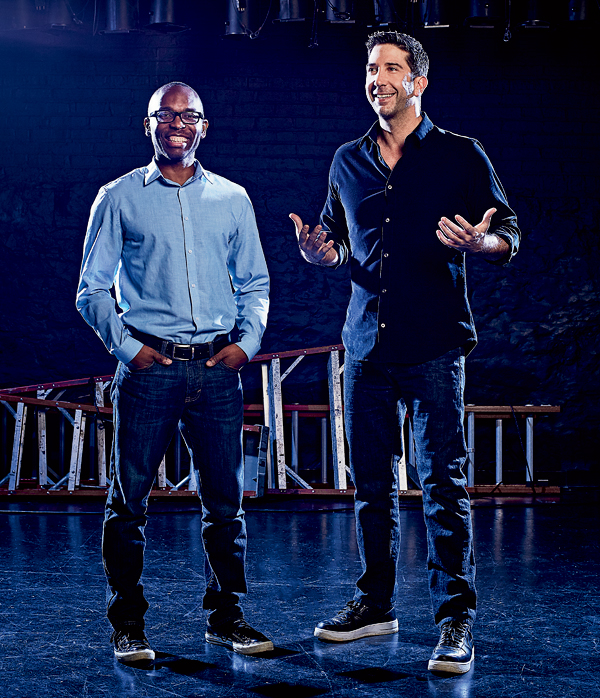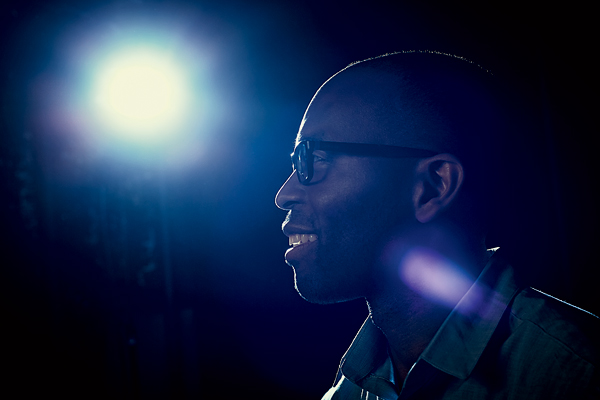
When he first read Kevin Douglas’s new play, Plantation!, David Schwimmer knew instantly that he wanted to direct it. “The idea was so original, and Kevin’s such a gifted writer, that it was a no-brainer,” says Schwimmer.
The plot revolves around a white woman in present-day Texas who decides to make amends for a legacy of slavery by giving her plantation to the descendants of a slave her family owned. Ahead of the show’s February 21 premiere at Lookingglass, Schwimmer, who helped found the theater company shortly after graduating from Northwestern in 1988, and Douglas, an ensemble member, sat down to discuss tackling racial healing through humor.
How did the idea for the play come about?
KD:I thought about what reparations would look like now. If you knew that your family had owned slaves, what would you do? Lillian, the Texas matriarch in my play, wants to leave an untarnished legacy, and she wants to make the world a better place. And her daughters are not happy with that decision.
DS:Her daughters have not turned out to be the enlightened women that Lillian hoped.
Why tackle such a weighty topic in a comedy?
KD:When black people are together, there are things we say about white people that we wouldn’t say around white people. And when white people get together, there are views they share that they wouldn’t in front of black people. There’s comedy to be had there.
DS:Plus, people are more open-minded when they laugh.

How do your different experiences with race inform the play? Kevin, you spent your early years in Texas; your high school diploma has a Confederate flag on it.
KD:I moved to Texas from Canada when I was 10, and I lived in Dallas–Fort Worth for 11 years. I had Jamaican parents who didn’t want to ruffle any feathers, but I was learning about race and American history. One time, when I was working in a grocery store, Jerry Springer was on in the break room and the topic was mixed-race couples. A white guy in the break room said, “Race mixing is wrong. In the Bible, you don’t see bears and rabbits fucking.” I’d be in jail right now if I fought every experience. So I hold on to that anger and deal with it through comedy.
DS:I’ve always been curious about race because of how I was raised. My parents made an effort to put my sister and me in integrated schools. I’m 51, so this was in the ’60s and ’70s. Then I got to Northwestern and realized, Wow, this is really white. It was much more segregated than I was accustomed to. After college, I learned more about Chicago, and I realized just how much I benefit from being a white male heterosexual in this country. So when we started to make theater, I gravitated toward stories of social injustice. I agree with Studs Terkel: Race is an American obsession, and it informs every single interaction we have on a daily basis.
Why make Plantation! an all-women play?
KD:I only saw it as an all-women cast. I know these women. The Chicago sisters are an amalgamation of my wife and her sisters and friends. The Texas women are an amalgamation of women I’ve met in Texas. When I thought about the characters, I heard their voices.
DS:And this play is not interested in romance. It’s about acknowledging the fact that people benefited financially for decades from slave labor. It’s about the question, What are reparations, and how does one make reparations?
What’s the play’s answer to that?
KD:I don’t think it means money. That’s where the problem lies. Everyone hears “reparations” and they think, Oh, we gotta give all the black people money now. That’s not what it’s about. Georgetown once sold 272 slaves to save the university, and now it’s making amends by changing the names of buildings to the names of the slaves it sold. It’s about figuring out how to make amends.
DS:The definition of reparations is not to compensate. It’s to repair. And there’s a lot to be repaired with race relations. We hope people come away thinking, What can I do to help repair?
Kevin, your wife, Tamberla Perry, plays the youngest Chicago sister. Did you write that character with her in mind?
KD:I did. There are lines in the play that I’ve heard her say. We were at a party, and there were a lot of white people dancing. And she says to me, “Are they dancing, or are they making fun of dancing?” I’m like, “That’s going in the play.”


